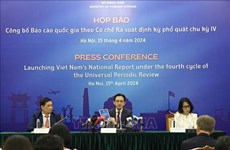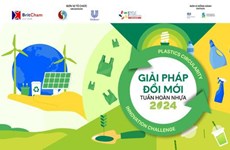Sustainable livelihoods help with forest protection
A Japan International Cooperation Agency (JICA)-funded project has
relieved local people living in the buffer zone of Bach Ma National Park
of reliance on natural resources to make their living.
A Japan International Cooperation Agency (JICA)-funded project has
relieved local people living in the buffer zone of Bach Ma National Park
of reliance on natural resources to make their living.
Covering 37,487 ha in the districts of Phu Loc and Nam Dong of the central province of Thua Thien Hue, Bach Ma National Park is home to 2,373 species of plants, or 17 percent of the total floral species, and 1,715 species of fauna, or 7 percent of the country’s faunas.
As many as 12,000 households are residing in the buffer zone of the park and their habit of intensively taking forest resources for granted to sustain their livelihoods left ugly hard-to-cure scars on the area.
The problem greatly concerned the Bach Ma National Park Management Board which has then come up with the idea that the best way to protect and preserve the Park is to create every possible condition it can to support these people.
Receiving funding from JICA, the Bach Ma National Park Management Board launched the Bach Ma Coal project in July, 2008, targeting around 140 households in Phu Loc and Nam Dong districts.
Through to March, 2013, benefiting households have learnt how to produce charcoals made from rice husks and wood chips as well as coal products to be used for cultivation and animal husbandry.
They have mastered the technology to make Bokashi organic fertiliser and pesticides from herbal vegetables such as gingers, garlic and hot peppers, grow organic vegetables and raise organic livestock, which not only serve their meals but also go to others’ dinner tables in Da Nang and Thua Thien Hue.
According to experts from the Tokyo University of Agriculture and Technology of Japan, apart from improving buffer zone residents’ incomes, the project has also raised their awareness of protecting the environment and using organic products for the sake of their healthy lives.
Since 2000, the Bach Ma National Park community development centre has also received consultancy and funding from the German Development Service (DED) for forest preservation efforts.
The JICA-funded project proved that when the living standards of buffer zone residents are improved with new livelihoods, forest resources will be utilised wisely.-VNA
Covering 37,487 ha in the districts of Phu Loc and Nam Dong of the central province of Thua Thien Hue, Bach Ma National Park is home to 2,373 species of plants, or 17 percent of the total floral species, and 1,715 species of fauna, or 7 percent of the country’s faunas.
As many as 12,000 households are residing in the buffer zone of the park and their habit of intensively taking forest resources for granted to sustain their livelihoods left ugly hard-to-cure scars on the area.
The problem greatly concerned the Bach Ma National Park Management Board which has then come up with the idea that the best way to protect and preserve the Park is to create every possible condition it can to support these people.
Receiving funding from JICA, the Bach Ma National Park Management Board launched the Bach Ma Coal project in July, 2008, targeting around 140 households in Phu Loc and Nam Dong districts.
Through to March, 2013, benefiting households have learnt how to produce charcoals made from rice husks and wood chips as well as coal products to be used for cultivation and animal husbandry.
They have mastered the technology to make Bokashi organic fertiliser and pesticides from herbal vegetables such as gingers, garlic and hot peppers, grow organic vegetables and raise organic livestock, which not only serve their meals but also go to others’ dinner tables in Da Nang and Thua Thien Hue.
According to experts from the Tokyo University of Agriculture and Technology of Japan, apart from improving buffer zone residents’ incomes, the project has also raised their awareness of protecting the environment and using organic products for the sake of their healthy lives.
Since 2000, the Bach Ma National Park community development centre has also received consultancy and funding from the German Development Service (DED) for forest preservation efforts.
The JICA-funded project proved that when the living standards of buffer zone residents are improved with new livelihoods, forest resources will be utilised wisely.-VNA













